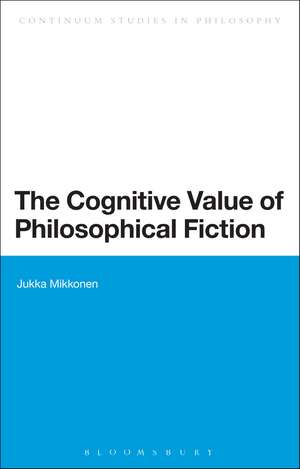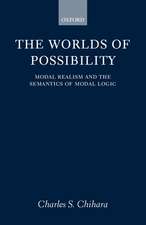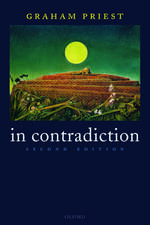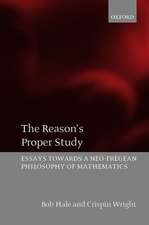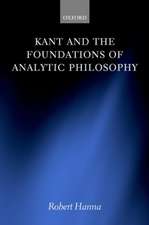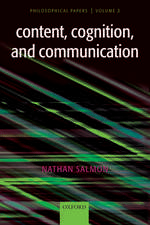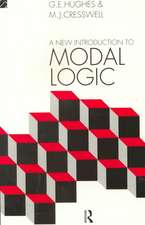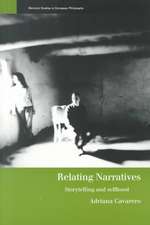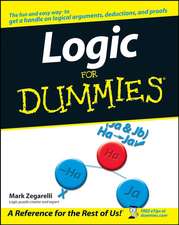The Cognitive Value of Philosophical Fiction: Bloomsbury Studies in Philosophy
Autor Dr Jukka Mikkonenen Limba Engleză Paperback – 16 iul 2014
| Toate formatele și edițiile | Preț | Express |
|---|---|---|
| Paperback (1) | 257.03 lei 6-8 săpt. | |
| Bloomsbury Publishing – 16 iul 2014 | 257.03 lei 6-8 săpt. | |
| Hardback (1) | 891.10 lei 6-8 săpt. | |
| Bloomsbury Publishing – 16 ian 2013 | 891.10 lei 6-8 săpt. |
Din seria Bloomsbury Studies in Philosophy
- 13%
 Preț: 257.50 lei
Preț: 257.50 lei - 13%
 Preț: 256.77 lei
Preț: 256.77 lei - 22%
 Preț: 256.20 lei
Preț: 256.20 lei - 13%
 Preț: 255.47 lei
Preț: 255.47 lei - 22%
 Preț: 237.28 lei
Preț: 237.28 lei - 22%
 Preț: 257.50 lei
Preț: 257.50 lei - 22%
 Preț: 773.81 lei
Preț: 773.81 lei - 13%
 Preț: 256.20 lei
Preț: 256.20 lei - 22%
 Preț: 258.89 lei
Preț: 258.89 lei - 13%
 Preț: 255.11 lei
Preț: 255.11 lei -
 Preț: 256.20 lei
Preț: 256.20 lei - 22%
 Preț: 772.58 lei
Preț: 772.58 lei - 22%
 Preț: 240.50 lei
Preț: 240.50 lei - 22%
 Preț: 257.03 lei
Preț: 257.03 lei - 23%
 Preț: 255.84 lei
Preț: 255.84 lei - 23%
 Preț: 255.29 lei
Preț: 255.29 lei - 13%
 Preț: 237.28 lei
Preț: 237.28 lei - 13%
 Preț: 235.00 lei
Preț: 235.00 lei -
 Preț: 258.42 lei
Preț: 258.42 lei -
 Preț: 256.49 lei
Preț: 256.49 lei - 14%
 Preț: 773.06 lei
Preț: 773.06 lei - 30%
 Preț: 774.03 lei
Preț: 774.03 lei - 30%
 Preț: 774.20 lei
Preț: 774.20 lei - 30%
 Preț: 774.86 lei
Preț: 774.86 lei
Preț: 257.03 lei
Preț vechi: 330.95 lei
-22% Nou
Puncte Express: 386
Preț estimativ în valută:
49.19€ • 51.16$ • 40.61£
49.19€ • 51.16$ • 40.61£
Carte tipărită la comandă
Livrare economică 14-28 aprilie
Preluare comenzi: 021 569.72.76
Specificații
ISBN-13: 9781472579669
ISBN-10: 1472579666
Pagini: 240
Dimensiuni: 156 x 234 x 13 mm
Greutate: 0.34 kg
Ediția:New.
Editura: Bloomsbury Publishing
Colecția Bloomsbury Academic
Seria Bloomsbury Studies in Philosophy
Locul publicării:London, United Kingdom
ISBN-10: 1472579666
Pagini: 240
Dimensiuni: 156 x 234 x 13 mm
Greutate: 0.34 kg
Ediția:New.
Editura: Bloomsbury Publishing
Colecția Bloomsbury Academic
Seria Bloomsbury Studies in Philosophy
Locul publicării:London, United Kingdom
Caracteristici
Introduces the main themes in philosophical discussions of literature and knowledge.
Notă biografică
Jukka Mikkonen is a postgraduate researcher in the Department of Philosophy at the University of Tampere, Finland.
Cuprins
1. Introduction: Cognition, Knowledge and Truth2. Fictive Use of Language3. Literature and Truth4. Meaning and Interpretation5. ConclusionEpilogue: The Grey ZoneBibliographyIndex
Recenzii
There is plenty to admire in this elegant little book. It offers one of the most thorough explorations in print of how works of literary fiction can engage in an important kind of philosophical labor. A must-read for anyone with a serious interest in the intersection of philosophy and literary studies.
Jukka Mikkonen contributes a welcome new voice, at once meticulous and creative, to contemporary discussion of what has become known as "philosophy through literature". In The Cognitive Value of Philosophical Fiction intentionalist semantics is shown to be capable of taking significant account both of characteristically literary uses of language and of literary activity as a range of social practices. In part through seeking to defuse the well-known objections, Mikkonen uses this semantics to develop a powerful case for a nuanced version of the claim that certain forms of imaginative literature offer genuine and distinctive cognitive gains, with particular attention to how it is that they do so.
Jukka Mikkonen offers a well-informed overview of the discussion about literature and knowledge in analytic aesthetics and a distinctive theory of his own, pointing to three ways for literary works to contribute to knowledge by communicating truths. This is a sensible and perceptive analysis of one of the classical problems in the theory of literary art.
It would be hard to find anyone better informed than Jukka Mikkonen about recent analytical philosophical debates on fiction and cognition. He is a reliable and perceptive guide to the whole terrain.
In short, the book is not only an interesting contribution for readers who are already familiar with the debate, but also a valuable source for those looking for an introduction to the field.
Mikkonen's book is not only useful as an introduction and an overview of this important debate but is also a tour de force in articulating its own view. The argumentative power by which it considers, criticizes, and supports various positions deserves respect.
Jukka Mikkonen contributes a welcome new voice, at once meticulous and creative, to contemporary discussion of what has become known as "philosophy through literature". In The Cognitive Value of Philosophical Fiction intentionalist semantics is shown to be capable of taking significant account both of characteristically literary uses of language and of literary activity as a range of social practices. In part through seeking to defuse the well-known objections, Mikkonen uses this semantics to develop a powerful case for a nuanced version of the claim that certain forms of imaginative literature offer genuine and distinctive cognitive gains, with particular attention to how it is that they do so.
Jukka Mikkonen offers a well-informed overview of the discussion about literature and knowledge in analytic aesthetics and a distinctive theory of his own, pointing to three ways for literary works to contribute to knowledge by communicating truths. This is a sensible and perceptive analysis of one of the classical problems in the theory of literary art.
It would be hard to find anyone better informed than Jukka Mikkonen about recent analytical philosophical debates on fiction and cognition. He is a reliable and perceptive guide to the whole terrain.
In short, the book is not only an interesting contribution for readers who are already familiar with the debate, but also a valuable source for those looking for an introduction to the field.
Mikkonen's book is not only useful as an introduction and an overview of this important debate but is also a tour de force in articulating its own view. The argumentative power by which it considers, criticizes, and supports various positions deserves respect.
